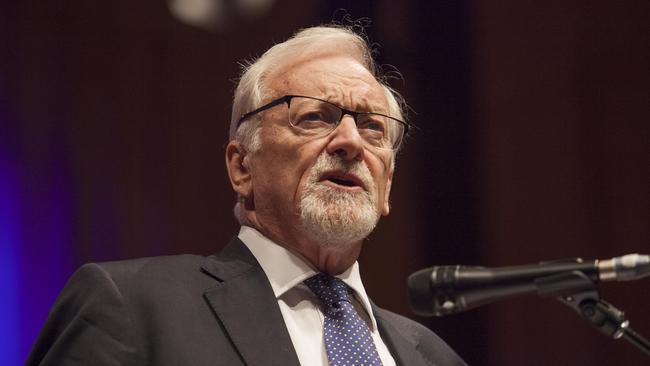University free speech by invitation only
University review recommended speakers should only be immune from sanction if invited.

Three of Australia’s highest profile university chancellors have called for the easing of a key constraint on campus free speech which, if accepted, would allow invited speakers to express views in university venues that do not meet “scholarly standards”.
The change would mean anti-vaxxers and advocates of other non-scientific beliefs could speak at universities under the protection of the model code on free speech, provided they were invited by a recognised group in the university community.
The chancellors — the Australian National University’s Gareth Evans, the University of Queensland’s Peter Varghese and the University of Western Australia’s Robert French — recommended the change to the model code, originally written by Mr French in his review of campus freedom of speech, following a review requested by other chancellors.
The review followed a decision by the chancellors, at their representative body meeting in May, to pull rank on their vice-chancellors and give in-principle approval to the model code, which was designed to set a common standard for free speech across all universities. They also asked a three-person working group made up of Mr Evans, Mr Varghese and Mr French to review the text of the code in the light of comments made by chancellors during the meeting.
The original code allowed universities to bar any visiting speaker whose speech content was likely to “involve the advancement of theories of propositions which purport to be based on scholarship or research but which fall below scholarly standards to such an extent as to be detrimental to the university’s character as an institution of higher learning”.
In an email to chancellors, Mr Evans said the working group decided “to differentiate more clearly the conditions appropriate to apply to the two distinct categories of speakers already defined in the code”; one category being visiting speakers who were invited by the university community and the second category being visiting speakers who were not invited but who could be, for example, hiring a university venue.
For invited speakers, “an absolute minimum of constraint should apply — recognising the centrality of free intellectual inquiry to the whole idea of a university”, Mr Evans wrote.
As a result, the working group’s revised code limits the right to refuse a speaker on the basis of non-scholarly standards. It allows only visiting speakers who have not been invited by the university to be banned for failing to meet scholarly requirement.
In order to escape the stricture, a visiting speaker whose speech falls below “scholarly standards” needs to be invited. Invitations can be extended by university officials and bodies as well as student bodies and recognised student societies or associations.
In his email to chancellors, Mr Evans acknowledged the difficulty of the issue for universities.
He said it was a “vexed question” to decide “the conditions appropriate to apply to visiting speakers espousing positions seen as obnoxious, unscholarly or even (for example, in the case of ‘anti-vaxxers’) dangerous”.
The University Chancellors Council will consider the recommendation in October.




To join the conversation, please log in. Don't have an account? Register
Join the conversation, you are commenting as Logout